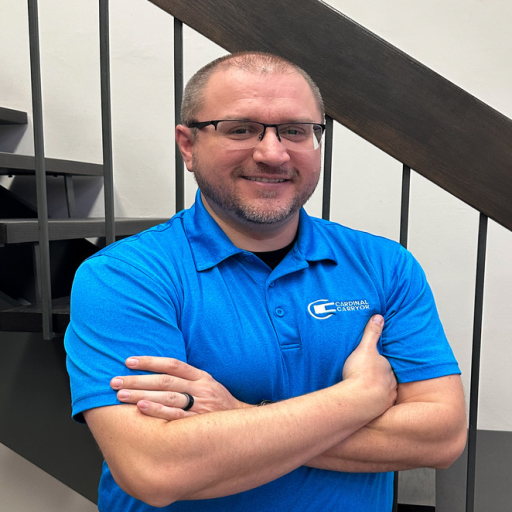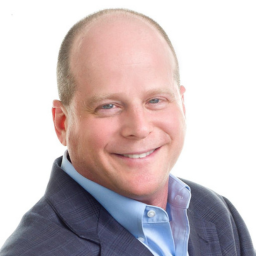Brad Mills talks about his leadership style and what he’s learned through the years.
By Nicole Needles
BRAD MILLS, VICE PRESIDENT and operations manager at Cardinal Carryor, has a career journey that exemplifies dedication and adaptability. Mills brings a forward-thinking approach to automation and client communication. A family man at heart, he values the industry’s family-oriented culture, which allows him to balance his career with his role as a husband and father of three. The MHEDA Journal sat down with Mills to learn more about his leadership style and what he’s learned through the years.
TMJ: Can you give a brief overview of your career journey and how you got to where you are today?
Mills: The joke I always tell is that no one plans to be in our industry, at least not outside of those with family ties. You just kind of end up here. I actually started working at UPS right out of high school because, here in Louisville, they cover college tuition. I worked as a forklift operator there. During college, around 2007 and 2008, we hit that economic downturn, so I had to take a second job at Walmart, which I thought would be temporary. But a decade later, I was a manager at both companies, working both jobs simultaneously. Needless to say, my life was eating, sleeping and working for almost a decade.
Luckily for me, I was able to meet my amazing wife during that time. When we had our first child, I knew I needed to make a career change to be more present. Being a regional manager for Walmart during the day and working at UPS at night didn’t leave much time for family. When one of my closest friends came over to see our child, she mentioned that her company was hiring customer service representatives and that I should apply. She could see how burned out I was, and I was ready for a change. So within one week of my son being born, I was interviewing at Cardinal Carryor and accepted an offer shortly after. I started in customer service and sales, quickly moved into the role of rental manager, then operations manager and now, as of this time next year, I’ll be taking over the company when Mr. Baker retires. So, it’s been about 11 years here, and I always joke that I’m the only 37-year-old I know with over 30 years of management experience.
TMJ: What changes have you witnessed during your career, and what things have stayed constant?
Mills: Automation has been the biggest shift in the industry. Seeing how quickly it’s evolved from where it was when I started to where it is now is impressive. We’re lucky to have partners like Crown and Tennant who are on the front lines of these advancements, allowing us to help our customers without having to go through the learning curve ourselves.
As for what’s stayed constant, I’d say the importance of communication with customers has only grown. With the rise of e-commerce, people expect up-to-date information at all times. It’s no longer enough to say, “We’ll call you when it’s done.” They want real-time updates. We’ve partnered with companies like Tinnacity to offer systems where customers can track parts orders and approvals and see progress in real-time. If we’re not transparent with them, it can impact their business decisions. We as an industry have to continue to push our teams to provide the best customer experience possible so that our customers can be well-informed and make the best business decisions they can for their company.
TMJ: What three words best describe your leadership style?
Mills: Accountability, respect and problem-solving.
TMJ: What has been one of the biggest challenges you’ve faced, and how did you overcome it?
Mills: One of the biggest challenges has been adapting my leadership style throughout my career and balancing two very different management styles at UPS and Walmart. UPS, being unionized, required a more hands-off approach, guiding team members rather than working directly with them. Walmart, on the other hand, allowed me to be hands-on, working alongside my team and showing that I wouldn’t ask them to do anything I wouldn’t do myself. I had to figure out how to lead these two groups in different ways based on the restrictions I had in front of me.
This contrast forced me to adapt my leadership style to fit the environment, which ultimately made me a more versatile manager. So, while I was still helping unload trucks or stock shelves and helping with food prep for anyone on my team, I also expected my managers to be willing to do the same to help their employees. I wanted to earn the respect of every individual who worked for me, and I have carried that mentality over to my current role. We have the sales staff ride with technicians, train with our parts team and train with office staff so they understand what these departments deal with each day and better understand how to communicate processes to our customers.
TMJ: What advice would you give to someone up-and-coming in the industry or hoping to be in a managerial position?
Mills: Take in the knowledge and experience of industry veterans. Networking through MHEDA has been a game-changer for me. It allows us to see that certain challenges are industry-wide and not unique to us. Learning how others have addressed similar issues can offer new insights for our own operations.
TMJ: What is some of the best leadership or business advice you’ve received during your career?
Mills: I learned a concept called the “pot roast principle” from a TED Talk, and I’ve repeated it so many times that my team probably hears it in their sleep. The story is about a woman cutting the ends off a roast because her mom always did. When she asks her mom why she does it that way, she then reveals that was how her mother taught her. Turns out, the woman’s grandmother did it because her pot wasn’t big enough.
This story illustrates that just because something was done a certain way before, doesn’t mean it’s still relevant today. There is typically a valid reason why a process was done a particular way, and it might have worked appropriately for a long time. However, that doesn’t mean that the same process is necessary today. I always challenge my team to never be afraid to ask “Why?” Because if that individual they ask really works through the process there might be a more efficient or cost-effective way to accomplish this task.
TMJ: Is there anything else you’d like to add?
Mills: I’m incredibly grateful for the family-oriented culture here. One of the reasons I joined the company was the respect they have for work- life balance. Coming from my previous career path, it’s a huge relief to work with a team that values family. My wife Ashlie and I have three kids – Landon, who’s 11, Hudson, who’s 7 and Grayson, who’s six months old. Being able to balance my work and family life is invaluable. The industry is full of family-oriented companies that really “get it.”




